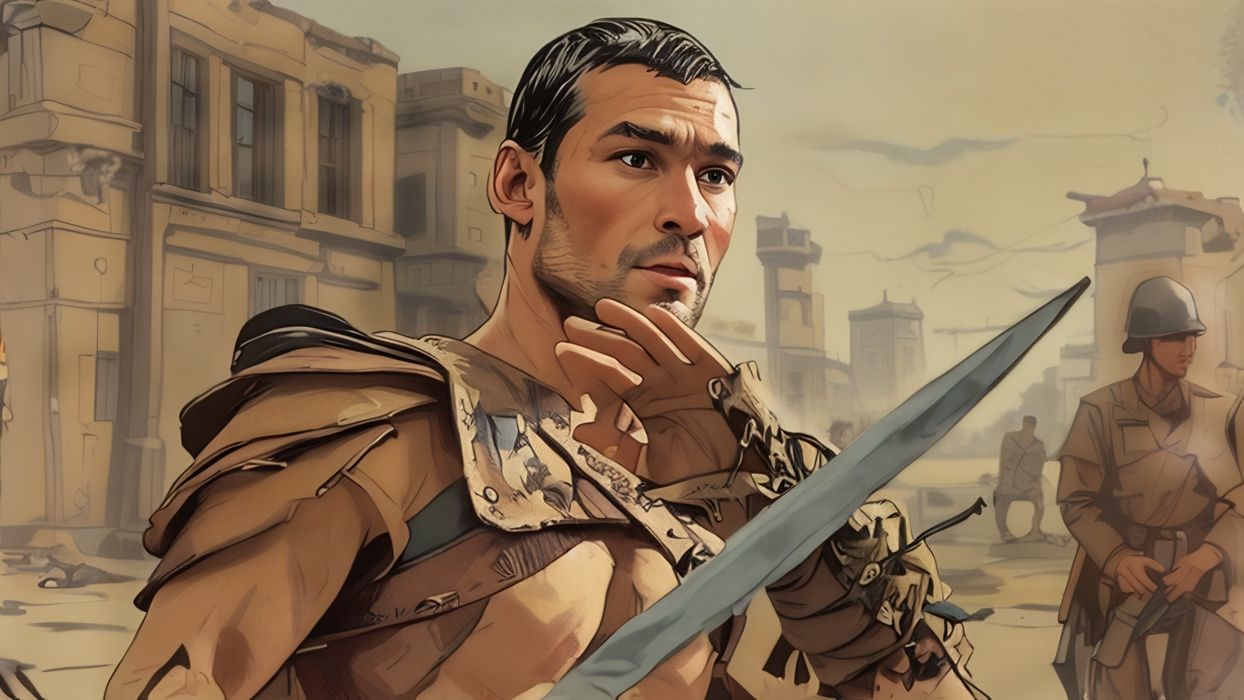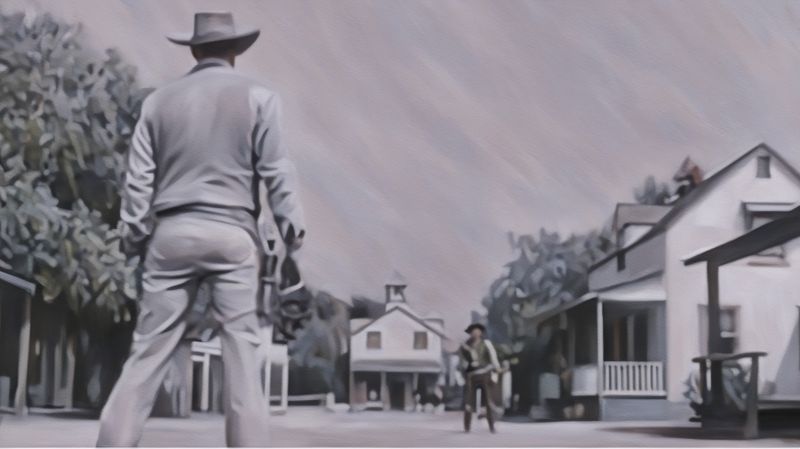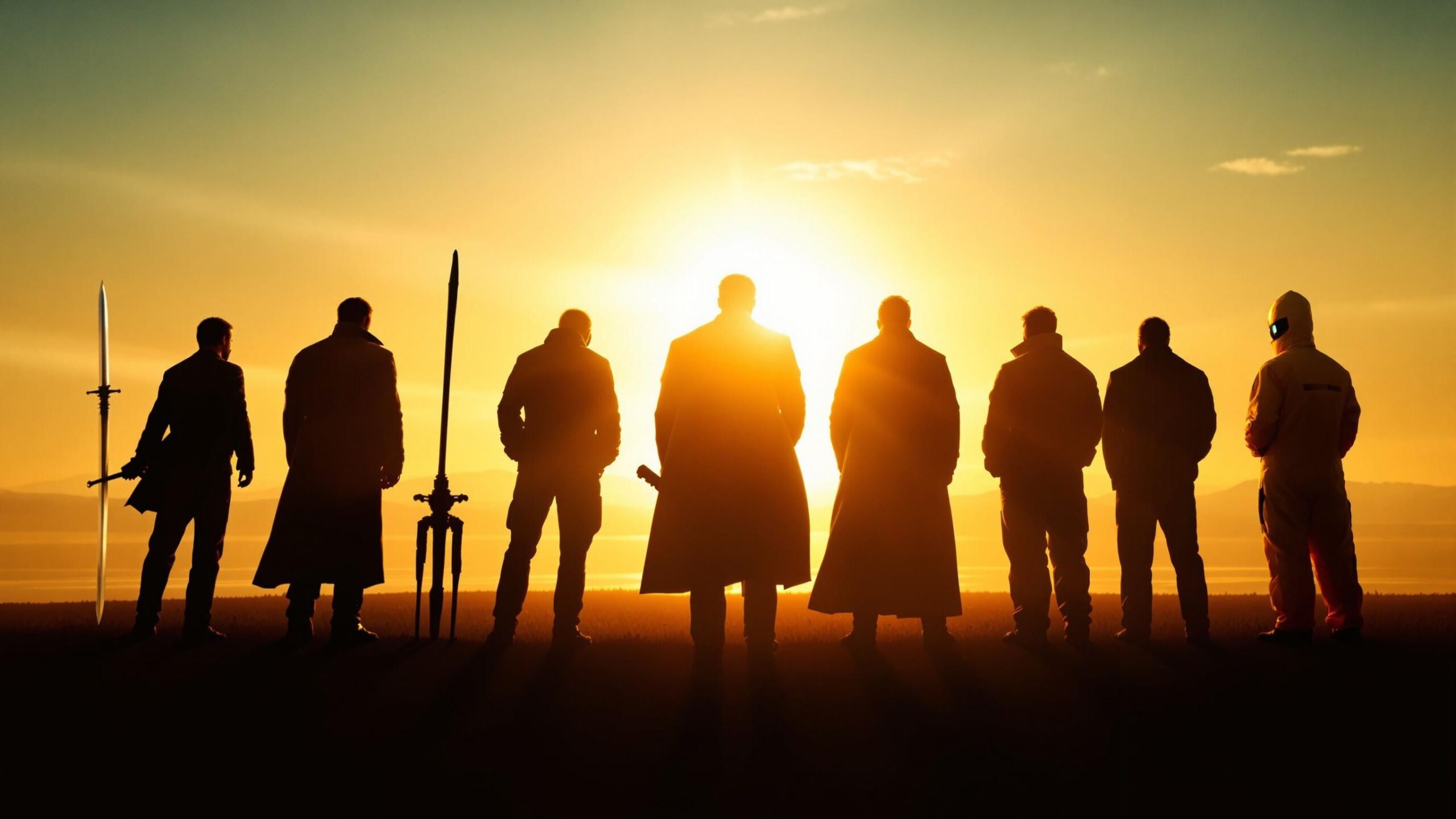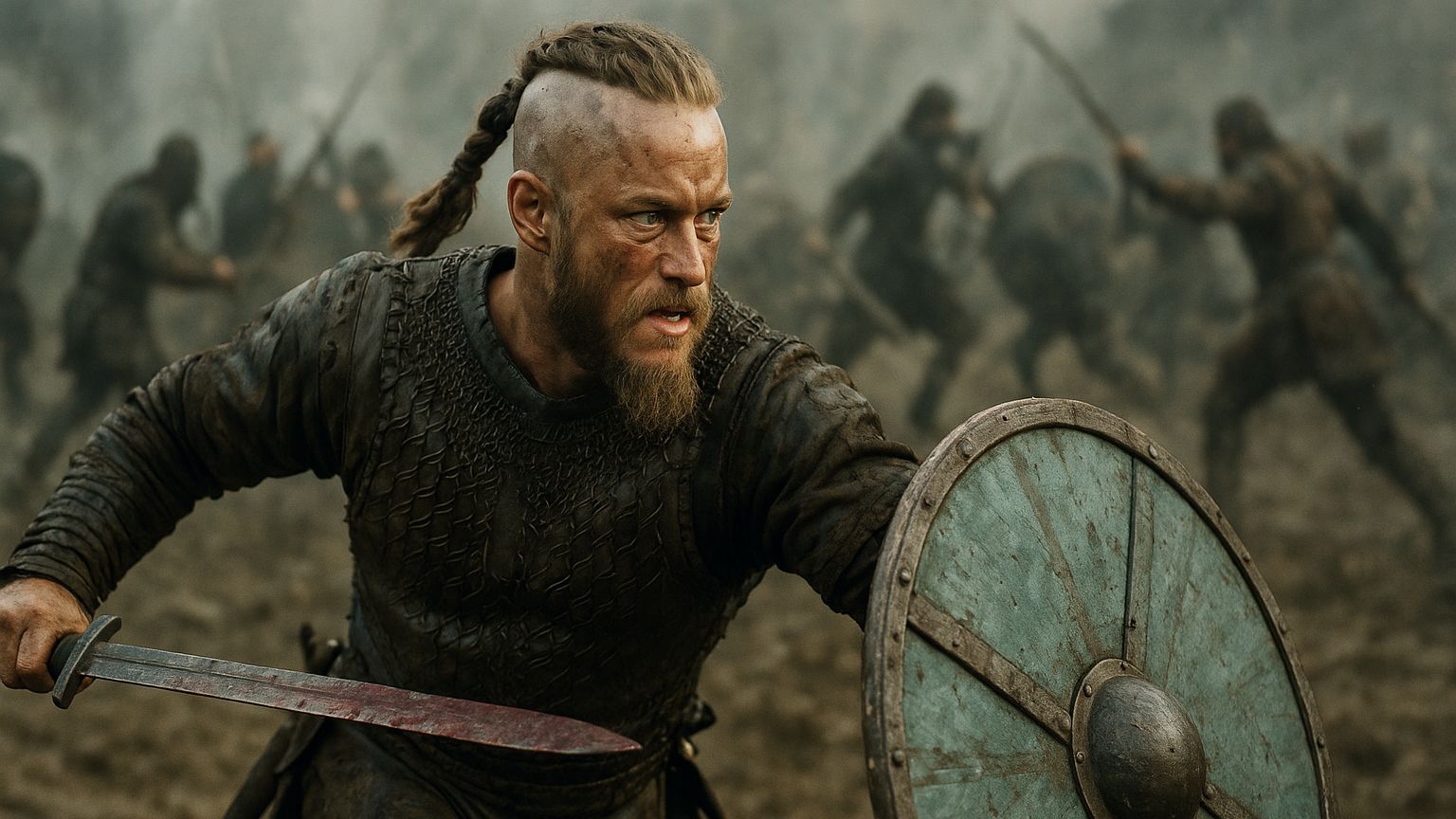In Spartacus: Blood and Sand, the story of a Thracian warrior forced into slavery becomes more than a tale of blood-soaked arena battles—it becomes a powerful testament to the human spirit’s refusal to bow. Spartacus, brought to life by Andy Whitfield in a performance filled with raw emotion and fire, transforms from a grieving husband into a leader who dares to challenge the very empire that shackled him. Each of his actions, fueled by loss, loyalty, and love for freedom, inspires those around him to dream beyond their chains. Whether raising his sword in the arena or delivering speeches that shake the walls of the ludus, Spartacus isn’t just a warrior—he’s a symbol. These ten moments highlight the fire that made him more than a man—they reveal the moments that made him a legend.
#10: Defying Death in His First Arena Battle (Episode 2, “Sacramentum Gladiatorum”)
Thrown into the arena for the first time, untrained and unprepared, Spartacus faces overwhelming odds. Surrounded by seasoned fighters and jeered by bloodthirsty crowds, his death is expected, even welcomed. But something extraordinary happens he survives. Not by luck, but by sheer willpower, instinct, and an unrelenting desire to return to his wife, Sura. With each blow he dodges and every counterstrike he lands, it becomes clear that Spartacus refuses to die for the amusement of Rome.
What makes this moment so inspiring isn’t just the victory—it’s the defiance. Spartacus doesn’t fight for glory or coin. He fights for love, for purpose, for freedom. And in doing so, he begins to chip away at the brutal spectacle of the games. His performance earns the crowd’s roar, but more importantly, it earns him the attention of those in power—setting in motion the journey from nameless slave to feared gladiator.
This moment marks the birth of resistance. Spartacus does not accept his fate—he challenges it with every swing of his sword. In an arena designed to break men, he rises. And with that rise, hope sparks among the broken.
#9: Refusing to Kill Varro (Episode 9, “Whore”)
Perhaps one of the most heart-wrenching and morally complex moments in the series is when Spartacus is forced to fight his closest friend, Varro, to the death. The fight is staged by Batiatus, who craves spectacle and views the gladiators as expendable tools. Spartacus is horrified, refusing to strike the final blow, pleading with Varro to find a way out. But when Varro drops his guard, Spartacus is left with no choice—he kills him, his face etched with grief and fury.
What follows is not just heartbreak but transformation. Spartacus’s sorrow turns to rage, not at Varro, but at the system that demanded this cruelty. In this moment, he fully realizes the dehumanizing evil of the Roman machine and begins planning to bring it down. The death of Varro becomes a catalyst—not only for Spartacus’s rebellion but for the unity of the other gladiators, who finally see the truth through Spartacus’s eyes.
This moment is inspiring because it reveals the depth of Spartacus’s humanity. He doesn’t revel in victory. He mourns loss. And from that mourning comes conviction. He understands that to change the world, he must first endure its worst cruelty—and refuse to be broken by it.
#8: Fighting Without a Weapon (Episode 3, “Legends”)
During a demonstration match meant to entertain the guests of Batiatus, Spartacus is forced into combat without a weapon—an intentional humiliation meant to showcase his inferiority. Yet what follows is one of the series’ most jaw-dropping displays of instinct, agility, and raw determination. Using the environment and his opponents’ own weapons against them, Spartacus defies expectations and defeats multiple armed gladiators with his bare hands.
This moment electrifies the crowd but stuns his peers even more. Spartacus proves that the strength of a gladiator doesn’t come solely from steel—it comes from the will to survive and the refusal to be subjugated. The look in his eyes during the fight is unflinching. There’s no fear. Just focus. Even stripped of every advantage, Spartacus remains dangerous.
What inspires here isn’t just the physical feat—it’s what it symbolizes. Spartacus shows the other slaves and fighters that power doesn’t always come from rank or weaponry. It can come from the unbreakable belief that you are more than what others say you are. It’s a moment that elevates him from a skilled fighter to a symbol of resistance.
#7: Publicly Challenging Crixus to Unite the Gladiators (Episode 10, “Party Favors”)
Tensions between Spartacus and Crixus reach a boiling point after countless episodes of posturing, insults, and philosophical divides. While Spartacus fights for freedom, Crixus remains loyal to the brotherhood of the arena and clings to his personal glory. But when the ludus begins to unravel under Batiatus’s increasingly erratic rule, Spartacus does the unthinkable—he challenges Crixus, not to a death match, but to unity.
In the training yard, with gladiators watching and tempers flaring, Spartacus confronts Crixus head-on. His words are firm, his tone unwavering: “They fear us united, brother. That is why they keep us at each other’s throats.” He lays bare the strategy of their captors—divide and conquer—and asks Crixus to rise above ego for the sake of something greater.
This moment is electric because it’s not about dominance—it’s about leadership. Spartacus risks humiliation and rejection but instead ignites a spark. It’s the first time the gladiators are invited to dream of more than survival or glory. They’re asked to dream of freedom. It’s a rallying cry in disguise, one that shifts the entire tone of the show and paves the way for revolution.
What makes this moment so inspiring is Spartacus’s vulnerability. He doesn’t beg. He doesn’t threaten. He appeals to shared pain and purpose. And in doing so, he begins forging the bonds that will lead to rebellion. It’s the beginning of a movement, born not in blood, but in brotherhood.
#6: Refusing to Kill a Woman in the Arena (Episode 5, “Shadow Games”)
In one of the most powerful moments of moral resistance, Spartacus is pitted against a female gladiator during a public exhibition. The crowd is bloodthirsty, demanding a spectacle. His opponent is fierce, skilled, and fully expecting to die. But as the battle reaches its climax, Spartacus knocks her to the ground—and then does nothing.
He lowers his weapon. He looks to the stands. And in front of the screaming masses, he refuses to deliver the final blow. The silence that follows is deafening. Batiatus seethes. The crowd grows confused. But in that quiet defiance, Spartacus does something even more profound than win a fight—he reclaims his soul.
This act of mercy is a rejection of the rules that Rome lives by. He’s not just sparing her life—he’s challenging the very notion that lives are to be discarded for sport. In refusing to become what they want, he becomes more than a man in chains—he becomes a man of principle, willing to face punishment for preserving his humanity.
This moment is inspiring because it shows that the truest strength isn’t always in swinging the sword—it’s in knowing when not to. Spartacus’s refusal to kill doesn’t make him weak. It makes him unshakable.
#5: Speaking to the Slaves in Secret (Episode 11, “Old Wounds”)
In a dark, hidden corridor beneath the ludus, Spartacus gathers a small group of slaves for a hushed conversation. They are cooks, cleaners, attendants—people beaten into submission by years of servitude. Many have never even imagined rebellion. But Spartacus speaks to them not with fire, but with resolve. He tells them freedom is not a dream—it’s a goal worth bleeding for. “They take everything from us,” he says. “But they cannot take our will, unless we surrender it.”
What’s remarkable here is that Spartacus doesn’t promise victory. He doesn’t claim to be invincible. Instead, he offers a choice. To fight. To resist. To live or die with dignity. His words ripple through the group like a spark through dry grass. Some walk away. Some stay. But all of them consider a future they were told could never be theirs.
This moment is deeply inspiring because it shows Spartacus at his most influential—not in the arena, but in the shadows, planting seeds of rebellion. He doesn’t just wield a sword—he wields belief. He empowers others to find the fire in themselves, and in doing so, builds a revolution not just of muscle, but of mind and spirit.
#4: Rallying the Gladiators to Rebel (Episode 12, “Revelations”)
This is the turning point—the moment Spartacus steps fully into the role of leader, not just of the arena, but of a movement. After learning the truth about his wife’s murder at the hands of Batiatus, the emotional dam bursts. Grief becomes fury, and fury becomes resolve. Spartacus finally sees the whole system for what it is: a machine built to destroy, manipulate, and control. And he decides—there will be no more submission.
In the candlelit depths of the ludus, he gathers the strongest and most loyal of his brothers and delivers a speech that will forever echo in the halls of TV history. “We are more than the blood they spill. More than the names they brand upon us. We are men. And we will be free.” His voice rises, a storm of rage and purpose, as he outlines the plan to strike. Every word is electric, laced with pain and vision. Every face in the room, once dulled by suffering, lights up with belief.
What makes this moment so inspiring is the sheer audacity of it. Spartacus isn’t just organizing a mutiny—he’s declaring war on an empire, armed with little more than willpower and righteous fury. He knows the cost. He accepts it. Because the fight for freedom is worth everything.
This scene transforms Spartacus from survivor to revolutionary. It’s not the start of the rebellion—it’s the soul of it. And it’s the moment the world would never be the same again.
#3: Freeing Doctore from His Oath (Episode 13, “Kill Them All”)
As the rebellion ignites in the final episode of Blood and Sand, Spartacus comes face-to-face with one of his greatest moral crossroads: Oenomaus, the former Doctore. A warrior bound by duty and trained to believe in the sanctity of the ludus, Oenomaus is torn between justice and loyalty. Though he once mentored Spartacus, he now stands in the way of the uprising.
But Spartacus doesn’t seek revenge—he offers liberation. In a tense and emotional confrontation, Spartacus spares Oenomaus’s life and delivers a heartfelt truth: “You are not their creature. You are a man.” With sword lowered, Spartacus extends something the Roman system never could—choice. He recognizes Oenomaus’s honor and gives him a path back to himself.
The moment hits hard. In the middle of chaos, where vengeance could easily rule, Spartacus chooses mercy and respect. And it works. Oenomaus is shaken, changed. Though he doesn’t immediately join the rebellion, the seed is planted—and it will bloom in Spartacus: Vengeance.
This act of grace is one of Spartacus’s most inspiring because it proves he’s not just freeing bodies—he’s freeing minds. Even in battle, he sees the man behind the mask. It’s a testament to his growth as a leader and his unwavering commitment to building a future worth fighting for.
#2: Leading the Final Assault on Batiatus’s Villa (Episode 13, “Kill Them All”)
The title says it all. After a season of torment, betrayals, and bloodshed, Spartacus takes the fight directly to the heart of his oppressors. With blades hidden beneath tables and coded words passed among conspirators, the gladiators turn a Roman celebration into a massacre—and their first step toward revolution.
The final moments are a storm of vengeance and liberation. Spartacus fights like a man possessed—every strike powered by years of pain. But amid the chaos, what truly inspires is his clarity. He doesn’t lose himself in slaughter. He keeps his eye on the goal: to tear down the man who robbed him of everything and set his people free.
When Spartacus finally confronts Batiatus, there is no gloating. No grandstanding. Just righteous justice. “Your name dies with you,” he says, before delivering the final blow. And with that, the gladiators are no longer slaves—they are rebels. They are brothers. They are free.
This moment is pure catharsis. After a season of dehumanization, it’s a declaration that the oppressed will rise. It’s not just the fall of a villain—it’s the birth of a legend.
#1: The Final Words to His Brothers (Blood and Sand, Episode 13, “Kill Them All”)
After the dust settles and the blood dries, Spartacus stands among the men he now calls brothers—not by training or coin, but by choice and cause. He looks into their eyes, all hardened by struggle yet glowing with something new: hope. With no masters left to obey and no chains left to break, Spartacus lifts his voice not as a gladiator, but as a free man.
“We have been slaves. We have been gladiators. We will be more.”
These words ring out like a vow—one not just for the rebels gathered around him, but for every viewer who ever dreamed of tearing down their own metaphorical chains. It’s not just a conclusion—it’s a promise. That their fight is just beginning. That freedom, however distant, is now within reach.
This final moment is the most inspiring because it encapsulates everything Spartacus has become. He’s no longer defined by vengeance or loss. He’s defined by purpose. He doesn’t ask his men to follow him. He leads them—toward a dream bigger than any arena, any vendetta. A dream of liberation, not just for themselves, but for all who suffer under tyranny.
It’s a closing statement worthy of a myth. And it’s the perfect punctuation to a season that didn’t just entertain—it moved, challenged, and inspired.
Spartacus: Blood and Sand wasn’t just a tale of swords and spectacle—it was the story of a man who transformed pain into power, loss into leadership, and captivity into revolution. Each of these ten moments marked a step in that journey, revealing not only a fierce warrior, but a visionary, a liberator, and a symbol of undying resistance. His legacy isn’t written just in blood—it’s written in the hearts he ignited. Spartacus inspired a rebellion. But more than that, he inspired hope. And in that, he became immortal.




